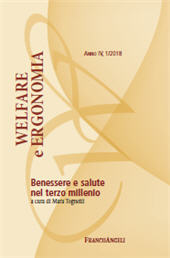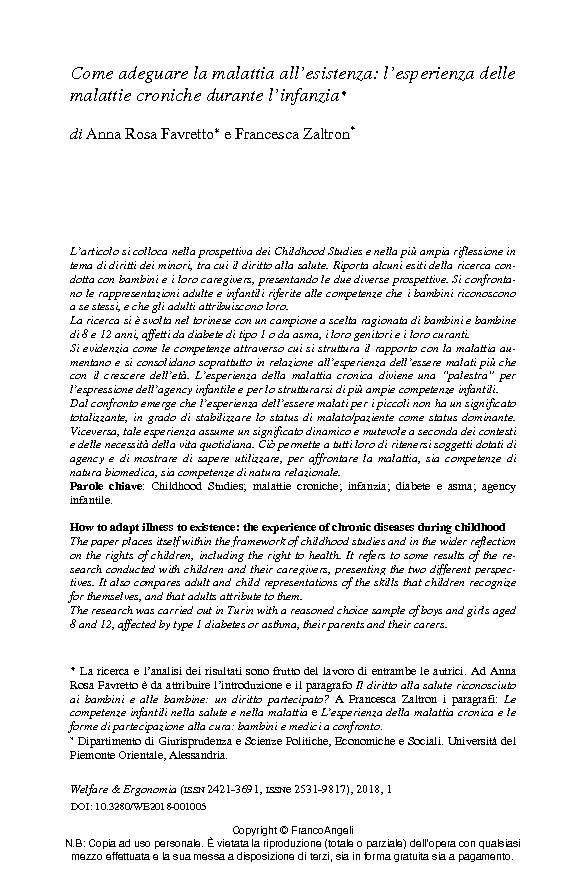Come adeguare la malattia all'esistenza : l'esperienza delle malattie croniche durante l'infanzia
87-101 p.
L'articolo si colloca nella prospettiva dei Childhood Studies e nella più ampia riflessione in tema di diritti dei minori, tra cui il diritto alla salute. Riporta alcuni esiti della ricerca condotta con bambini e i loro caregivers, presentando le due diverse prospettive. Si confrontano le rappresentazioni adulte e infantili riferite alle competenze che i bambini riconoscono a se stessi, e che gli adulti attribuiscono loro. La ricerca si è svolta nel torinese con un campione a scelta ragionata di bambini e bambine di 8 e 12 anni, affetti da diabete di tipo 1 o da asma, i loro genitori e i loro curanti.idenzia come le competenze attraverso cui si struttura il rapporto con la malattia aumentano e si consolidano soprattutto in relazione all'esperienza dell'essere malati più che con il crescere dell'età. L'esperienza della malattia cronica diviene una "palestra" per l'espressione dell'agency infantile e per lo strutturarsi di più ampie competenze infantili.
Dal confronto emerge che l'esperienza dell'essere malati per i piccoli non ha un significato totalizzante, in grado di stabilizzare lo status di malato/paziente come status dominante. Viceversa, tale esperienza assume un significato dinamico e mutevole a seconda dei contesti e delle necessità della vita quotidiana. Ciò permette a tutti loro di ritenersi soggetti dotati di agency e di mostrare di sapere utilizzare, per affrontare la malattia, sia competenze di natura biomedica, sia competenze di natura relazionale. [Testo dell'editore].
The paper places itself within the framework of childhood studies and in the wider reflection on the rights of children, including the right to health. It refers to some results of the research conducted with children and their caregivers, presenting the two different perspectives. It also compares adult and child representations of the skills that children recognize for themselves, and that adults attribute to them. The research was carried out in Turin with a reasoned choice sample of boys and girls aged 8 and 12, affected by type 1 diabetes or asthma, their parents and their carers. It is noted that the skills which structure the relationship with the disease increase and consolidate most in relation to the experience of being ill rather than with growing up. The experience of chronic illness becomes a "gymnasium" for the expression of the child agency and for the structuring of wider childhood skills.
The comparison shows that the experience of being ill for young people does not have a totalizing meaning, capable of stabilizing the status of patient as the dominant one. Conversely, this experience takes on a dynamic and changing meaning according to the contexts and needs of daily life. This allows all of them to consider themselves as entities with agency and to show that they, in order to face the disease, know how to use both biomedical and relational skills. [Publisher's text].
Is part of
Welfare e ergonomia : IV, 1, 2018-
Articles from the same issue (available individually)
-
Information
ISSN: 2531-9817
DISCIPLINES
KEYWORDS
- Childhood Studies, malattie croniche, infanzia, diabete e asma, agency infantile
- Childhood Studies, chronic diseases, childhood, diabetes and asthma, childhood agency



